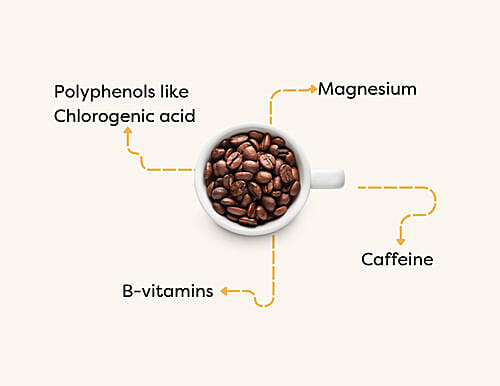Coffee: Benefits & how to make a healthy cup
16th Aug 2024
Coffee isn’t just a morning boost. It significantly contributes to our daily intake of polyphenols and supports health in several ways – from gut health to lowering risks of cancer, depression, Alzheimer’s and heart disease.
Key points
Health benefits of drinking coffee
Many studies link drinking coffee to a lower risk of several health conditions:
- Cancer – Regular coffee drinkers have an 18% lower risk of developing cancer compared to those who rarely drink it.
- Depression – Having 4 to 5 cups a day is tied to a 24% lower risk of depression than drinking less than 1 cup.
- Alzheimer’s disease – 1 to 4 cups daily could lower the risk by 21–32%.
- Liver disease – Any coffee (versus none) might lower the risk of liver problems, including non-alcoholic fatty liver disease (29%) and liver fibrosis (27%).
- Heart disease and stroke – 1 to 3 cups a day is associated with a 19% lower risk of heart-related deaths and 30% fewer deaths from stroke.
A major source of polyphenols
We often equate coffee with caffeine, but coffee beans contain over 100 bioactive compounds that might support health by increasing antioxidant defences, reducing inflammation and promoting the detoxification of carcinogens. Key compounds in coffee include:
- Polyphenols, especially chlorogenic acid — of which coffee is one of our top sources.
- Cafestol and kahweol
- Caffeine – the reason it gets you going in the morning.
- Magnesium and B vitamins

What about decaf?
It seems to offer many of the same benefits as regular coffee, like better heart health and a lower risk of some cancers. That said,, there aren’t as many studies on decaf and the benefits might depend on how the coffee is processed. If caffeine doesn’t suit you or for a later cup, decaf is still a great choice. Look for chemical-free methods like mountain water processing.
How many cups a day?
Research suggests 3 to 4 cups a day (about 2–3 mugs) is the sweet spot for the biggest benefits. But it’s personal – if you feel jittery or it disrupts your sleep, cut back or switch to decaf for a few cups.
A good balance might be 2 cups in the morning and 1 decaf in the afternoon, with other healthy drinks like green tea or cacao thrown in.
Timing your coffee
To keep caffeine from interfering with your sleep, aim to have your last cup 8–9 hours before bedtime. For example, if you sleep at 10 PM, finish your coffee by 2 PM.
But this is just a guideline since caffeine affects everyone differently. Its half-life can range from 1.5 to 9.5 hours, depending on factors like genetics, age, medications and lifestyle. So, adjust based on how caffeine affects your sleep quality (not just how quickly falling asleep).
First thing in the morning or after breakfast?
You might’ve heard that waiting an hour after waking to have your coffee can prevent energy dips later in the day. It’s an interesting idea, but there isn’t much evidence behind it. Do what feels best for you – whether it’s brewing a cup first thing or sipping it with breakfast.
What makes coffee healthier?
Not all coffee is created equal and its health benefits can vary a lot. One big factor is the amount of polyphenols, like chlorogenic acid, in your cup. A study testing 104 espressos found the levels ranged from just 6 mg to 188 mg per cup—that’s a huge difference! Several factors influence these levels:
- Where and how it’s grown: Coffee grown at high altitudes, organically, or in certain regions tends to have more polyphenols. These compounds are the plant’s natural defence against stress.
- Roasting and processing: Green coffee beans are naturally high in chlorogenic acid, but roasting breaks it down. Darker roasts can lose up to 90%, while lighter or medium roasts retain more of these beneficial compounds while still delivering good flavour.
- Grinding and brewing - more in this article from Exhale Coffee.
5 tips for healthier coffee
- Freshly roasted beans preserve more polyphenols.
- Choose organic to reduce pesticide exposure and possibly increase polyphenol content.
- Grind freshly just before brewing to protect it from degradation.
- Store properly in an airtight container, away from light and moisture.
- Keep it simple by skipping sugar, syrups and heavy cream. Enjoy it black, with a splash of milk, or add spices like cinnamon or turmeric for extra flavour and health benefits.
Plus, savour the ritual! Since caffeine is a stimulant, having it in a relaxed, calm way instead of rushing might also make the experience better. Slow down, enjoy the process, pick your favourite mug and take in the smell. It’s a simple way to add a bit of calm to your day while still feeling refreshed and focused.
For more tips, check out the Exhale Coffee blog and listen to episode #259 of the Doctor’s Kitchen podcast.
References/sources
Umbrella review: Poole et al. BMJ. 2017.
Depression risk: Wang et al. Aust N Z J Psychiatry. 2016
What defines a cup? Poole et al. BMJ Nutr Prev Health. 2019. PMID: 33235952
Delaying morning coffee: Antonio et al. J Int Soc Sports Nutr. 2024. PMID: 38466174
Coffee and sleep: Gardiner et al. Sleep medicine reviews. 2023. PMID: 36870101
Compounds & biological activities: Fischer et al. The Royal Society of Chemistry. 2019 | Makiso et al. Food Science & Nutrition. 2023
